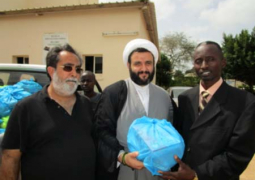This is one of the possible meanings of the mystical term “awakening” (yaqzah), which extends from the commencement of the spiritual journey to the end of divine unveiling, which dawns on the illuminated, insightful, and discerning wayfarer, revealing to him his innate inability in knowing and worshipping God.
In the same light, certain mystics interpret the famous saying by the Prophet, “Indeed desire overpowers my heart and I beseech God for forgiveness seventy times a day” (Majlisi, ibid., vol. 25, p. 204), as indicating the inevitable awareness of multiplicity that is consequent on remaining in this world of illusion, the rending of the seventy thousand veils of light, and the realization of the sad truth-namely, that compared to the Worshipped, the worshipper is utter nothingness and that in comparison to His Glory, the knowledge he gains and the worship he performs is not even so much as a drop in the ocean.
This is, of course, notwithstanding the opinion that accounts for the Prophet’s pleading forgiveness as pertaining to a pre-emptive prevention rather than consequent remission (Jawadi Amuli, Tafsir mawdui quran majid, vol. 11, pp. 159-160).
And it is possible that the prayer which the Prophet is reports as having uttered-“O my Lord, increase me in bewilderment in You”-was a plea for attaining existential expansion (tawsi ‘ih-yi wujudi) by means of arriving at the Station of Bewilderment (hayrah).
This bewilderment is, however, identical with the knowledge and awareness (rather that being the lack thereof), and thus the Prophet speaks of increasing, which signifies intensification and expansion in existence. For, as the wayfarer attains union with the Divine Essence, he is overwhelmed by love, joy, and intellective and intuitive and intuitive bewilderment as a consequence of experiencing the Lordly epiphanies.
Pronouncing his incapability in adequately praising God, the Noble Prophet (may God’s peace and blessings be upon him and his household) says, “I cannot offer a praise that becomes You, You are as You praise Yourself” (Majlisi, ibid., vol. 68, p. 23)
Elaborating on this topic, Aqa ‘Ali Mudarris Zunuzi states that the human being can be obligated to seek knowledge of God only in so far as the scope of human comprehension allows.
As such, he understands the abovementioned assertion by the Prophet-“We know You not as You are” (ma ‘arafnaka haqqa ma ‘rifatik)-as indicating that to know God adequately is to acknowledge the knowing Him is impossible (Mudarris Zunuzi, 1376, p.37). offering a grammatical analysis of Mudarris Zunuzi’s interpretation of the said Prophetic phrase, Ayatullah Jawadi Amuli explains that based on the common interpretation, the literal meaning is, “We cannot apprehend an adequate knowledge of You,” whereas based on Mudarris Zunui’s point of view, a more accurate translation of the phrase would be, “[To acknowledge that] we cannot know You is the most adequate knowledge of You that we can apprehend” (jawadi Amuli, Adabi fana-yi muqarraban, vol. 2,p.134).
The conclusion we may draw based on what has been said in the above is that the existential level of the Divine Essence-that is, Absolute Existence-is beyond the ken of the philosopher’s rational enquiry as well as the reach of the mystic’s intuition. Likewise, the entitative Divine Attributes, at their most sublime level, where they are identical with the Divine Essence, are eternally incomprehensible and so neither rational reasoning nor mystical intuition can hope to fathom them (ibid., p. 135).
This conclusion is supported by Prophet’s assertion concerning the incomprehensibility of the Divine Essence to the angels and the prophets alike:
Verily God is concealed from the comprehension of the intellects just as He is concealed from the perception of the eyes, and verily the Supernal Elite (al-mala’ al-a la) seek Him just as you seek Him.” (Mulla Sara, Mafatih al-ghayb, pp. 78 and 149)
The following verse aptly expresses this truth:
How can perception discern You as You are?
It is only to the extent of his discernment that every perceiver comprehends You.
Thus, the highest degree of knowledge that the mystic who has attained union can possess is to acknowledge his lack of knowledge of God, and the ultimate end of the slave’s worship is to acknowledge his failure in truly worshipping Him.
2. Awakening and Insight
In the pristine mysticism exemplified by the Prophet, the first step on the spiritual path is that the intellect should achieve awakening and the heart acquire insight. The human being must seize the opportunities he is afforded. As such, the mystic who is cognizant of the passing and knowledge-laden moments of spiritual wayfaring knows that he must place himself in the way of the Breeze of Divine Intimacy (nasim-i uns), inhale the Sacred Fragrance (nafih-yi gudsi), and seize the Moments of Divine Mercy (waqt-i rahmani). The Master of All the Worlds (Prophet Muhammad) has said, “Indeed there are breezes that flow from your Lord in your lifetimes. Lo! Place yourself in their way” (Majlisi, op. Cit., vol. 68, p. 23 and vol. 66 p. 292).
The following line by the mystic poet, Hafiz Shirazi, can be read as a succinct interpretation of the latter phrase:
The fragrance that the eastern wind carries from that forelock,
The curls of his black tree-what pain has it inflicted on the hearts.
The primary fabric of the human being was woven from the Divine Spirit- “So when i have proportioned him and breathed into him of My Spirit, fall down in prostration before him” (Quran 15-29).
He came into being from nothingness and he progresses toward his end by means of spiritual labour-“O human being, indeed you are labouring toward your Lord laboriously and you will meet Him (Quran 84:6).
The paragon of human perfection, Prophet Muhammad, warned humankind that if it desires to attain union with the Beloved, it must practice virtue and thereby arrive at the Station of Unity (maqam-i tawhid), advancing from the negative state of perfection to the positive-
Say ‘I am just a human being like you. It has been revealed to me that your God is the One God. So whoever anticipates meeting his Lord must act righteously and associate anyone with the worship of his Lord.’ (Quran 18:110)
The negative and the positive aspects of faith constitute the essential substance of the message brought by the World, the Seal of Prophethood, Muhammad; he announced, “Say, There is no god save God,’ that you may be felicitous. “This sacred attestation of unity is the distillation of Islam.
The awakening of the intellect and the insight of the heart enable one to sense and to be swayed by the divine allures (jadhabat) and epiphanies (jalawat). The gravitation toward these allures and epiphanies lead the enamoured wayfarer (whether he was enamoured after embarking on the spiritual journey, which would make him a salik-i majdhub, or was enamoured and then took to the spiritual journey, which would make him a majdhub-i-salik) to the ocean of Divine Beauty and Grandeur, whereby he sees the secrets of the earthly and the supernal realms (mulk and malakut), for “ When God desires to bless His slave, He opens the eye of his heart.” Divine grace (‘inayat-i ilahi) will then operate as a constant attraction, simulating him to advance through the stages of the spiritual journey, culminating in the stage “that on eye has perceived and no ear has heard from and that has not occurred to a human heart” (see Qummi, 1416, under the entry “sh-h-d”).
The awakened human being sets off on the journey from the state of earthly attachment (ta’alluq) to achieve intellection (ta’aqqul), from the realm of differentiation (ta’ayyun) to that of devotion (ta’abbud). He soars as high as his resolve takes him. Prophet Muhammad (may God’s peace and blessing be upon him and his household) has said, “Man flies by means of his resolve just as the bird flies by means of its wings.
“This wayfaring mystic who succeeds in completing the spiritual journey identifies everything with Him and seeks everything for His sake, for he is no longer with his self but is now with God; he has move beyond “I” and has attained union with ”Him“. Thus, filled with ecstasy, he chants, “He is the First and the Last, the Manifest and the Hidden”(Qur’ an 57:3). He constantly sings,
For beholding Your Countenance, spirit-perceiving eye is needed, for how can this come of my world-perceiving eye. (Hafiz, ghazal no.40).
To be continued
Read Other Articles In Article (Archive)
Boosting intra-African trade
Jan 30, 2012, 1:17 PM
Nature Reserve Management plan validated
Jan 13, 2012, 3:00 PM



